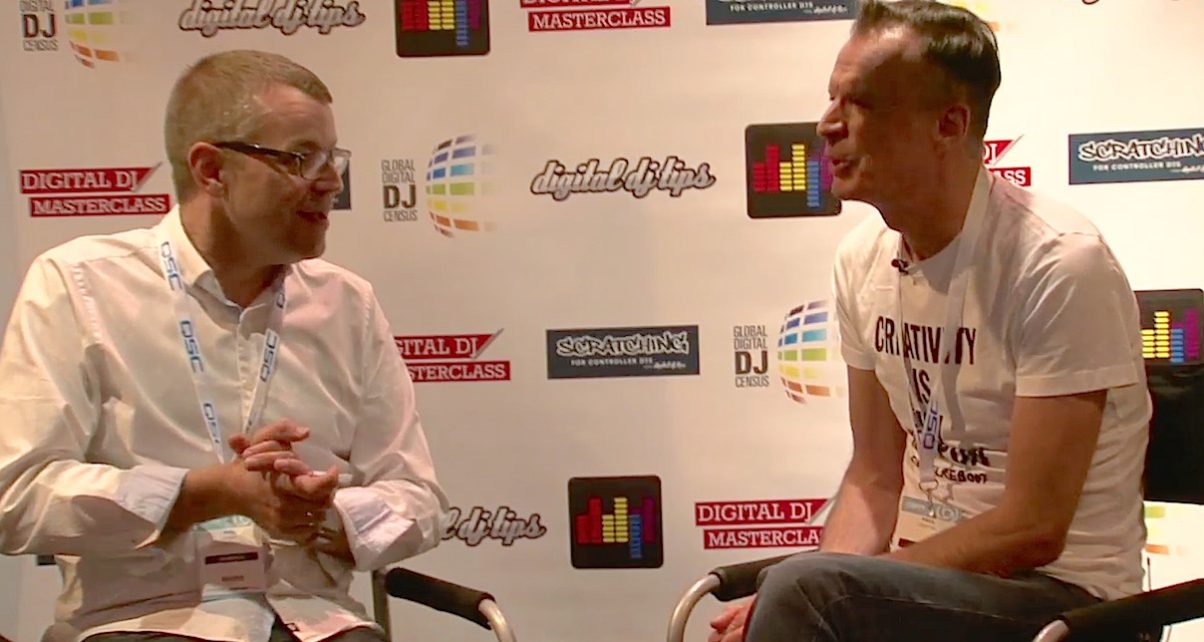
When I was at the BPM Show last week, I caught up with an old friend and hugely experienced DJ, producer and now radio host, Paul Dakeyne. Paul has been DJing for three decades, toured the world with Ministry of Sound, and topped the charts in the UK as a producer back in the 90s, so he know a thing or two about what works and doesn’t work in DJing.
We got chatting about all the changes in DJing in the past decades, and what may be around the corner (I actually hosted a panel at the show called “DJing – The Next Decade”, which we’ll bring you footage of at some point), and it became clear that Paul has some pretty strong views on the way DJing is going, and what’s good – and bad – about it.
What came across was that he really cares about helping new DJs to get the most out of their hobby/career, and so his advice is far from “it was so much better back then”, which many older DJs can’t help but fall into the trap of saying. Indeed, Paul is broadly very positive about the way DJing is going, but he’s spotted what he feels to be three “traps” new digitalDJs may fall into if they’re not wary.
You can watch him explain in full his thinking in my interview with him below, but here in brief are the three points he wanted to make – and the Digital DJ Tips take on them.
1. Only use uncompressed audio files
…that means WAV, FLAC, AIFF. Paul’s reasoning is they are the closest possible to the original, and in today’s age of faster broadband and bigger storage, the need to compress audio down to MP3 or AAC in order to fit more on to a hard drive etc or stream across the airwaves is diminishing rapidly. As DJs, he reasons, we should lead the charge against “lossy” formats, to future-proof ourselves and to ensure our audiences get the best audio humanly possible.
Digital DJ Tips says: Yes, in theory, this would be great. But not all gear works with these formats (Pioneer and FLAC, anyone?), these formats aren’t all user-friendly (WAV can’t store metadata like album covers, track titles etc), and such audio is sometimes unavailable, or more expensive. Also, many users aren’t quite there with the bandwidth / storage thing yet. But yes, if you can make uncompressed work for you, it’s a great idea.
2. The CD isn’t dead… so don’t turn your back on it just yet
Paul cites two arguments here. Firstly, that the CD was actually the height of audio quality, and that things have deteriorated since then (he argues it very well in the video), so if you have a choice, grabbing music from “back in the day” on CD is preferable to buying modern digital versions. Secondly, he points out that having a CD or two as a backup is a must for any digital DJ relying on laptop technology and so on.
Digital DJ Tips says: Agreed.. but it’s not just the CD at fault here. Dynamic range plays a huge part (music has unfortunately become more and more compressed), but nonetheless, yes, CDs sure did sound great (even though we can remember vinyl aficionados even back in the mid-80s moaning they weren’t as good as records!) Grab them if you can, even if only to rip. And we totally agree on having a second backup music source when DJing… but it doesn’t have to be CD, of course.
3.Don’t let technological gadgets get between you and your job as a DJ
Again, Paul argues this really well in the video. Stems, Flip, Remix Decks, sampling, finger drumming, controllerism, scratching even… all have their place in a DJ’s armoury if the DJ so desires. But the DJ who relies on such novelties and forgets the sacred connection between his or herself and the audience is making a fundamental error. Use tools to add to what you do, not to replace it, he pleads.
Digital DJ Tips says: Absolutely. We’ve all heard DJs overusing samples, or FX, or scratching, or even just filters, but of course now with controllerism, Remix Decks, Stems, Flip, Slip and so on, the temptation is great to overdo it. Our view is that everything you do as a DJ should complement if not always the tunes themselves, then definitely the night overall. Anything more is always unnecessary and detrimental.
The video interview
• Paul has been a DJ, producer and remixer for nearly three decades, and currently hosts the 80s Electropop Radio Show.
How do you feel about these points? Good advice? Do you follow one or all of them in your own DJing? Or are there some you don’t feel matter? Feel free to share your thoughts in the comments.








